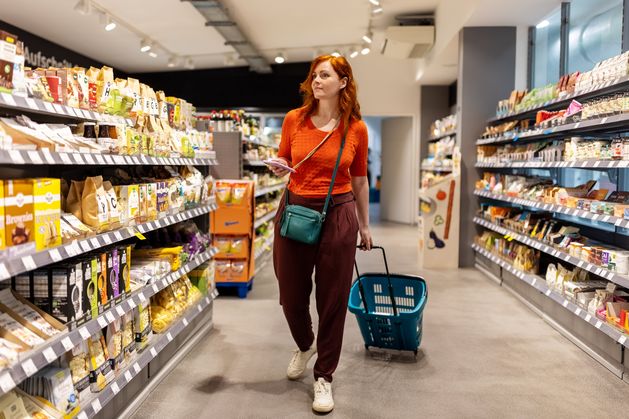Cattle prices are up 40pc in the last year, while milk prices, paid by dairy processors, are up 18pc
Cattle prices paid at marts in the last year are up by a record 40pc.
Milk prices paid by dairy processors, which affect the cost of a litre and the price of butter, are up 18pc in the last year, the latest Central Statistics Office (CSO) figures show.
Sheep prices are also up.
It comes at a time when food prices are already surging for consumers. Economists have warned that shoppers can now expect to pay even more to fill a trolley with food because the prices paid to farmers are rising so fast.
CSO statisticians said that overall prices paid to farmers for their produce in the year to March had jumped by 20pc, leading to fears that food inflation will get worse.
The CSO said it trawled through its records and cannot find a higher increase for beef prices paid at the farm gate than 40.04pc.
Recent figures show the price of a pound of butter in the shops has already risen by close to €1 over the past year to an average of €4.69, a jump of more than 26pc.
Beef, milk, cheese and lamb prices in the supermarkets have all shot up in the year to April.
The Taoiseach was told in the Dáil yesterday that he isn’t accepting the reality of people’s experience of galloping inflation, after he ruled out new cost-of-living measures in the coming Budget.
Micheál Martin confirmed to the Irish Independent last week in Brussels that there would be targeted measures on social protection and tax adjustments for 2026 – but no universal measures or “once-off” reliefs.
Sinn Féin leader Mary Lou McDonald suggested he did not know that a pound of butter now costs nearly €5, while a bottle of shampoo was even more expensive and had jumped 40pc in two years to nearly €10.
She cited contacts from members of the public to the main opposition party, including a woman who said her family’s weekly shop was now €260 a week, or well over €1,000 a month. Her last electricity bill had been for €460, she added.
The national cattle herd numbers have dropped, and more produce is going to Europe for a premium
Mr Martin replied: “I disagree fundamentally with the deputy’s presentation. No government across Europe, across the 27 member states of the EU, has provided as much as this Government and the previous government did in terms of cost-of-living supports.”
CSO statisticians said the most significant output price increases in the 12 months to March this year had been in cattle (+40.4pc), milk (+17.6pc), and sheep (+4.3pc), while decreases were recorded in potatoes (-9.3pc) and vegetables (-1.6pc).
It said that, over the last year, reductions in farmers’ input prices had been recorded for feed, which were down 5.5pc, and seeds, which were down 1.9pc.
Veterinary expenses increased by 4.7pc and fertilisers went up by 3.6pc.
Economist Austin Hughes warned that food prices in supermarkets would continue to climb.
Recent figures from consultants Kantar show that grocery prices are up by 5pc in the past year.
“The national cattle herd numbers have dropped, and more produce is going to Europe for a premium,” Mr Hughes said.
He warned that the rate of increase in meat and dairy prices paid by processors to farmers might have peaked, but they were not going down.
Economists warn that shoppers can expect to pay even more for a basket of food because the prices paid to farmers are rising
“Food inflation is going to be an issue for a while. Constrained supply and strong demand will keep prices rising,” he said.
Economist Trevor Donnellan of Teagasc, the national farm advisory agency, said the latest CSO agricultural price indices figures showed a “significant increase in the prices farmers are getting for cattle and sheep”.
However, he said that most farm incomes were low and farmers were largely dependent on income supports coming from Brussels.
He said supermarkets may hold back on pushing through the full rise in the cost of producing beef because meat was a key sales product for them and they would not want to discourage shoppers.
“Beef prices are not going up as much lately as the increase that farmers are getting. Supermarkets may take a hit, but if one or two of them push through price increases, others will follow,” Mr Donnellan said.
The Irish Farmers’ Association was asked whether farmers were reaping super-normal profits, but a spokesperson said average farm incomes were low.
They quoted Teagasc estimates showing that farm incomes for beef farmers will be between €10,000 and €17,000 in 2024. In 2023, their incomes were at a historically low level.
“While food prices have increased notably over the past three years, for over a decade before that, food prices remained unchanged while general inflation rose substantially in that same period,” the spokesperson said.
Arnold Dillon, director of Retail Ireland, a representative body for the sector, insisted retailers were committed to delivering value for consumers.
“Specific pricing decisions are a matter for individual retailers, but intense competition in the sector keeps prices down,” he said.
“Food inflation is a direct result of increased prices from manufacturers and producers supplying into the sector.”
#Families #face #hike #food #bills #surge #prices #paid #farmers #processors








